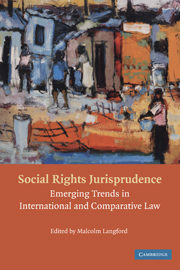Book contents
- Frontmatter
- Contents
- Foreword – Philip Alston
- Preface
- PART ONE OVERVIEW
- PART TWO SELECT NATIONAL JURISDICTIONS
- PART THREE REGIONAL PROCEDURES AND JURISPRUDENCE
- PART FOUR INTERNATIONAL HUMAN RIGHTS PROCEDURES AND JURISPRUDENCE
- 23 Committee on Economic, Social and Cultural Rights
- 24 Committee on the Elimination of Racial Discrimination
- 25 Human Rights Committee
- 26 Committee on the Elimination of Discrimination Against Women
- 27 Committee on the Rights of the Child
- PART FIVE SPECIAL TOPICS
- Notes on Contributors
- Table of Authorities
- Index
- References
26 - Committee on the Elimination of Discrimination Against Women
Women Claiming Economic, Social and Cultural Rights – The CEDAW Potential
Published online by Cambridge University Press: 05 June 2012
- Frontmatter
- Contents
- Foreword – Philip Alston
- Preface
- PART ONE OVERVIEW
- PART TWO SELECT NATIONAL JURISDICTIONS
- PART THREE REGIONAL PROCEDURES AND JURISPRUDENCE
- PART FOUR INTERNATIONAL HUMAN RIGHTS PROCEDURES AND JURISPRUDENCE
- 23 Committee on Economic, Social and Cultural Rights
- 24 Committee on the Elimination of Racial Discrimination
- 25 Human Rights Committee
- 26 Committee on the Elimination of Discrimination Against Women
- 27 Committee on the Rights of the Child
- PART FIVE SPECIAL TOPICS
- Notes on Contributors
- Table of Authorities
- Index
- References
Summary
INTRODUCTION
[I]nternational law accords priority to civil and political rights, rights that may have very little to offer women generally. The major forms of oppression of women operate within the economic, social and cultural realms.
Hilary Charlesworth, Christine Chinkin and Shelly WrightEconomic, social and cultural rights have a particular significance for women because as a group, women are disproportionately affected by poverty, and by social and cultural marginalization.
Montreal Principles on Women's Economic, Social and Cultural RightsIt is now generally recognised that economic, social and cultural rights are of particular significance to women, especially in light of women's historic and ongoing experiences of discrimination and inequality in social, economic and cultural realms. What remains relatively unexplored, however, is the issue of where, within the international human rights system, women's economic, social and cultural rights are best protected and promoted. This chapter argues that while a number of international treaties may be applicable, the Convention on the Elimination of All Forms of Discrimination Against Women (‘the CEDAW Convention’), which has been ratified by 182 States, has the potential to be the most effective international human rights instrument for the protection and promotion of economic, social and cultural rights for women.
The chapter unfolds in two main sections. It commences with an analysis of the characteristics of the Convention that make it particularly well placed to advance women's economic, social and cultural rights claims.
- Type
- Chapter
- Information
- Social Rights JurisprudenceEmerging Trends in International and Comparative Law, pp. 553 - 568Publisher: Cambridge University PressPrint publication year: 2009
References
- 1
- Cited by



